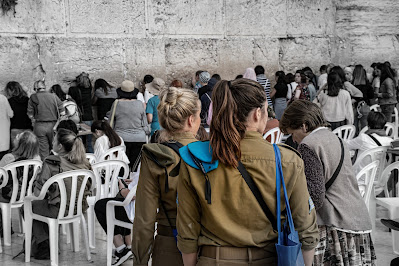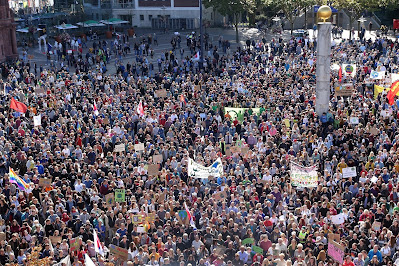NETANYAHU'S JUDICIAL REFORMS SPARK LARGEST PROTESTS IN ISRAEL'S HISTORY
Israeli Prime Minister Benjamin
Netanyahu has announced that he will delay plans to reform the country's
judicial system, following widespread protests against the proposed changes. The
move represents a significant victory for civil society groups and opposition
politicians, who had argued that the reforms would undermine the independence
of the judiciary and threaten the rule of law.
The proposed changes, which were
first unveiled in February, would have given the government greater control
over the appointment of judges and would have restricted the powers of the
Supreme Court. Critics argued that the reforms would have allowed Netanyahu to
pack the courts with loyalists and would have weakened the ability of the
judiciary to hold the government accountable.
Netanyahu has defended the
proposed changes, arguing that they are necessary to prevent judicial activism
and to ensure that judges are more accountable to the public. He has accused
the courts of overstepping their authority and of seeking to undermine his
government's policies.
However, the proposals have been
met with fierce opposition from civil society groups, who have accused
Netanyahu of trying to undermine the rule of law and of seeking to protect
himself from prosecution. Netanyahu is currently facing multiple corruption
charges, and his trial is due to resume in April.
The delay in implementing the
proposed changes comes after weeks of protests, both online and in the streets.
Demonstrators have gathered outside the homes of senior politicians and judges,
calling for the proposed reforms to be scrapped. The protests have been led by
a coalition of civil society groups, including the Israeli Bar Association, the
Association for Civil Rights in Israel, and the Movement for Quality Government
in Israel.
The protests have been fueled by
concerns over the future of Israel's democracy. Critics have argued that the
proposed reforms represent a further erosion of democratic norms and that they
threaten to turn Israel into a "judicial dictatorship".
The delay in implementing the
proposed changes has been welcomed by civil society groups and opposition
politicians, who have praised the power of popular protest in a democratic society.
However, they have warned that the fight is far from over and that they will
continue to push for a more independent and robust judiciary.
Opposition leader Yair Lapid has
called on Netanyahu to withdraw the proposed reforms entirely, arguing that they
represent a threat to Israel's democracy. He has also called for a full inquiry
into the prime minister's conduct and for his trial to be allowed to proceed
without interference.
The delay in implementing the
proposed reforms has also been welcomed by international observers, who have
expressed concern over the state of democracy in Israel. The European Union has
called on Israel to respect the rule of law and to ensure the independence of
the judiciary.
The United States, Israel's
closest ally, has also expressed concern over the proposed reforms. Secretary
of State Antony Blinken has urged Israel to ensure that its democratic
institutions are "strong and independent" and has warned against any
attempts to "undermine" the rule of law.
The delay in implementing the
proposed reforms has been seen as a significant victory for civil society
groups and opposition politicians, who have been calling for greater
accountability and transparency in Israeli politics. However, they have warned
that the fight is far from over and that they will continue to push for a more
independent and robust judiciary.
The proposed reforms have also
raised concerns about the future of Israel's relationship with the
international community. Many observers have warned that the reforms could lead
to increased isolation and could damage Israel's reputation as a democracy.
The delay in implementing the
proposed changes represents a significant moment in Israel's history, as civil
society groups have successfully pushed back against what they see as an
attempt to undermine democratic norms and the rule of law. However, the future
of Israeli democracy remains uncertain, and the country will continue to face
challenges as it seeks to maintain its status as a democratic state in the face
of domestic and international pressure.
The controversy over the proposed
judicial reforms highlights the growing polarization of Israeli politics and
the increasing challenges facing the country's democratic institutions. Israel
has long been regarded as a vibrant democracy with a strong tradition of civil
society activism and independent media. However, recent years have seen a
growing sense of disillusionment among many Israelis over the state of their
democracy.
The issue of judicial
independence has become a particularly contentious issue, with critics accusing
Netanyahu of seeking to undermine the judiciary in order to protect himself
from prosecution. Netanyahu is facing multiple corruption charges, and his
trial has been a major source of political tension in Israel. Some critics have
argued that the proposed reforms are an attempt to undermine the judiciary's
ability to hold the prime minister accountable.
However, supporters of the
reforms argue that they are necessary to ensure that the judiciary is more
accountable to the public and that it does not overstep its authority. They
have accused the courts of engaging in "judicial activism" and of
interfering in the work of the government.
The debate over the proposed
reforms reflects a broader trend towards the politicization of Israel's
democratic institutions. Many Israelis are increasingly disillusioned with
their political leaders and institutions, and there is a growing sense that the
country's democracy is under threat.
The recent protests against the
proposed reforms have highlighted the resilience of Israel's civil society and
the power of popular protest in a democratic society. However, they have also
raised questions about the future of Israel's democracy and its relationship with
the international community.
Israel's democracy is facing
significant challenges, including increasing polarization, the erosion of
democratic norms, and rising tensions with the international community. The
delay in implementing the proposed reforms is a positive development, but it is
only the beginning of a much larger struggle to protect and strengthen Israel's
democratic institutions. It will require sustained efforts from civil society
groups, political leaders, and the broader public to ensure that Israel remains
a vibrant and inclusive democracy in the years to come.
The controversy over the proposed
judicial reforms has also highlighted the complex relationship between Israel's
domestic politics and its foreign policy. Israel has long been regarded as a
strategic ally of the United States and a key player in the Middle East.
However, its domestic politics have increasingly become a source of concern for
its international partners, who fear that Israel's democratic institutions are
being eroded.
The delay in implementing the
proposed reforms is likely to be welcomed by Israel's allies, who have
expressed concerns over the potential impact of the reforms on the country's
democratic institutions. The United States and the European Union have both called
on Israel to respect the rule of law and to ensure the independence of the
judiciary.
However, the controversy over the
proposed reforms is also likely to have wider implications for Israel's foreign
policy. Many observers have warned that the reforms could damage Israel's
reputation as a democracy and could undermine its standing in the international
community.
Israel's relationship with its
Arab neighbors is also likely to be impacted by the controversy over the
proposed reforms. Israel has been engaged in a series of normalization
agreements with several Arab states in recent years, and its relationship with
these countries is seen as a key element of its foreign policy strategy.
However, the controversy over the proposed reforms is likely to raise concerns
among these countries about Israel's commitment to democratic values and the
rule of law.
The controversy over the proposed
reforms is also likely to have wider implications for the Middle East as a
whole. Many observers have warned that the erosion of democratic norms in
Israel could fuel further instability in the region and could exacerbate
existing tensions between Israel and its neighbors.
The delay in implementing the
proposed reforms is a positive development, but it is only the beginning of a
much larger struggle to protect and strengthen Israel's democratic
institutions. Israel's civil society and political leaders will need to work
together to ensure that the country remains a vibrant and inclusive democracy
in the face of increasing challenges.
It will also be important for
Israel's international partners to continue to engage with the country on
issues of democracy and human rights. The United States and the European Union,
in particular, have a responsibility to support Israel's efforts to protect and
strengthen its democratic institutions, while also holding the country
accountable for any actions that undermine these values.
In the end, the controversy over
the proposed judicial reforms highlights the challenges facing Israel's democracy
in the 21st century. Israel has long been regarded as a beacon of democracy in
the Middle East, but it now faces significant challenges to its democratic
institutions and values. The delay in implementing the proposed reforms is a
small victory, but much more work needs to be done to ensure that Israel
remains a vibrant and inclusive democracy for generations to come.
















0 Comments